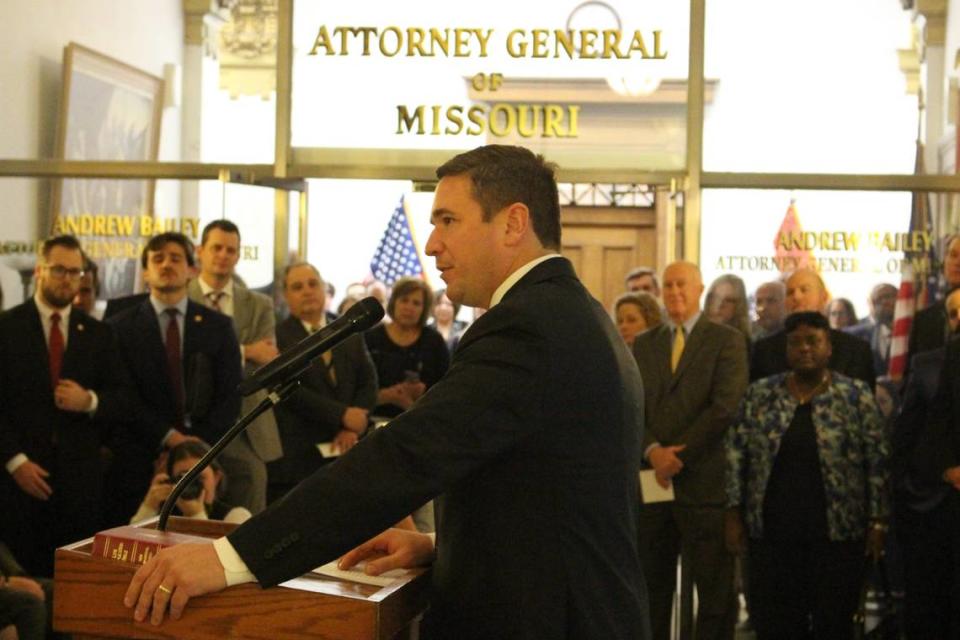Missouri AG has targeted several officials for removal. Ray County sheriff is the latest
Ray County Sheriff Scott Childers will have his first day in court next week as Missouri Attorney General Andrew Bailey seeks to permanently remove him from office over allegations he unlawfully allowed prisoners to perform work for friends and smuggle in contraband.
For Bailey, ousting elected officials is becoming a regular part of his job.
The court process Bailey deployed against the sheriff, called quo warranto, is often seen as a last resort to stop a corrupt elected official. But Bailey, a Republican in a tough primary campaign, has used quo warranto at least four times since taking office in January 2023, a faster pace than his recent predecessors.
The Star identified just five quo warranto actions filed by the four most recent past attorneys general, Eric Schmitt, Josh Hawley, Chris Koster and Jay Nixon. The Missouri Attorney General’s Office didn’t provide any cases beyond the ones found by the newspaper.
Bailey’s four quo warranto cases are each distinct. In two instances, the officials resigned before courts determined whether they should remain in office, handing Bailey the outcome he desired. The other two cases remain ongoing.
But none attracted more attention than the effort against Kim Gardner, who was the St. Louis circuit attorney before resigning under pressure in May 2023. Bailey alleged Gardner had failed to effectively prosecute. Gardner’s supporters accused Bailey of wielding the quo warranto process for political ends.
At the time, Gardner, through her attorneys, said Bailey’s petition failed to meet the extremely high bar to remove her. In court documents, her attorneys wrote that Bailey’s petition was “a gross power grab, an affront to the liberties of all Missourians.”
Bailey, who was appointed attorney general by Republican Gov. Mike Parson after Eric Schmitt resigned to become a U.S. senator, has had a brash legal presence since taking office. He has filed numerous lawsuits, including against Planned Parenthood, and launched investigations popular with hard-right Republicans.
In many ways, the quo warranto case against Gardner fit well within the aggressive public presence Bailey, who was previously Parson’s general counsel, has staked out as attorney general. The effort was highly publicized and allowed him to draw significant attention to crime in St. Louis, a frequent focus of attention for Missouri Republicans.

Senate Minority Leader John Rizzo, an Independence Democrat, recently told reporters that Bailey is using the quo warranto process too much. He suggested Bailey is taking all sorts of legal actions in an attempt to draw attention to himself during the primary campaign.
“He’s going to do whatever he needs to do to keep his name in the paper and he’s flailing and his opponent is representing Donald Trump,” Rizzo said, referring to Will Scharf, a Republican lawyer who is representing the former president.
The three other quo warranto cases haven’t produced anything close to the same level of controversy as the Gardner episode.
Jim Layton, a former Missouri solicitor general under Koster and Nixon, both Democrats, said quo warranto is typically only used in a clear-cut case. An attorney general may be using quo warranto more because more officials merit that significant step, he said.
“If there are that many, that would be more than in the past, but that may be a function of what issues have come up and not his priorities or thoughts, because it’s very issue-driven,” Layton said.
The three other quo warranto cases involve officials in largely rural areas. Iron County Sheriff Jeff Burkett resigned after Bailey alleged he worked with a local resident to plot to kidnap the resident’s children from their mother following a domestic dispute. Burkett now faces criminal charges.
Bailey filed a quo warranto action against Cape Girardeau Coronover Wavis Jordan, alleging he stole cash from a dead person and provided false information to vital records. The quo warranto case is ongoing but Jordan is also facing criminal charges.
The final case is the ongoing action against Childers.
“As Attorney General, it is my duty to hold accountable those who refuse to do their job as required by Missouri law,” Bailey said in a statement. “A writ of quo warranto has a high burden of proof, but when we look at the evidence and it’s clear a case needs to be filed, we enforce the law as written.”
The quo warranto process has a long history in Missouri, with the attorney general using it to remove officials disloyal to the United States following the Civil War. The process has been used against corporations for violating their charters and against politicians accused of graft. In the modern era, quo warranto has most often ended with an official resigning rather than a court removal, according to the Missouri Attorney General’s Office.
Rep. Lane Roberts, a Joplin Republican who chairs the House Crime Prevention and Public Safety Committee, said some attorneys general will view quo warranto differently than others.
“My sense of Andrew Bailey is that he feels that people in those positions should live up to the responsibility,” Roberts said. “He may be just a little more assertive about holding their feet to the fire.”

Case against sheriff progressing
When Bailey filed a quo warranto petition against Childers on March 6, he alleged Childers unlawfully allowed prisoners to leave or be released from jail and stated on social media a plan to use detainees to work at his home or at other businesses. He allowed prisoners to drive vehicles, make purchases at local stores and even leave the state.
Additionally, Bailey’s office alleged that in addition to allowing prisoners to bring in contraband, he allowed conjugal visits and allowed released prisoners to work on his property, along with the property of friends and acquaintances. Childers also received or accepted a benefit in exchange for keeping prisoners in the jail, Bailey’s office says.
Childers first won election in 2020 and is running for reelection. He has operated a controversial operation branded as an inmate work program.

In a motion to dismiss, an attorney for Childers wrote that the sheriff developed an “innovative work program” given that the Ray County jail was old and crowded, with prisoners incarcerated longer than is typical because of a backlog of unprosecuted cases.
The motion alleges Bailey’s petition contains “bare assertions” and hasn’t shown the sheriff usurped or unlawfully held office.
“Instead, the pleadings show that Respondent implemented an inmate work program to help the community, improve the mental health of inmates, and provide work skills that inmates could use upon reentry to society,” Childers’ attorney, Kevin Corlew, wrote in the motion.
In response, Missouri Assistant Attorney General Ted Bruce argued in a court filing that quo warranto is appropriate and reiterated the allegations against him.
“The violations were willful because Respondent had been informed by judicial and elected officials that his conduct was not lawful,” Bruce wrote.
A judge removed Childers on a preliminary basis shortly after Bailey filed the quo warranto petition. A hearing on Childers’ motion to dismiss is set for April 30.
In a video posted to social media on April 11, Childers told supporters that he had done nothing that would embarrass them. He promised to put the citizens of the county first.
“The truth is out there. I feel good about everything,” Childers said. “I’ll let my attorneys take care of the rest from there.”

